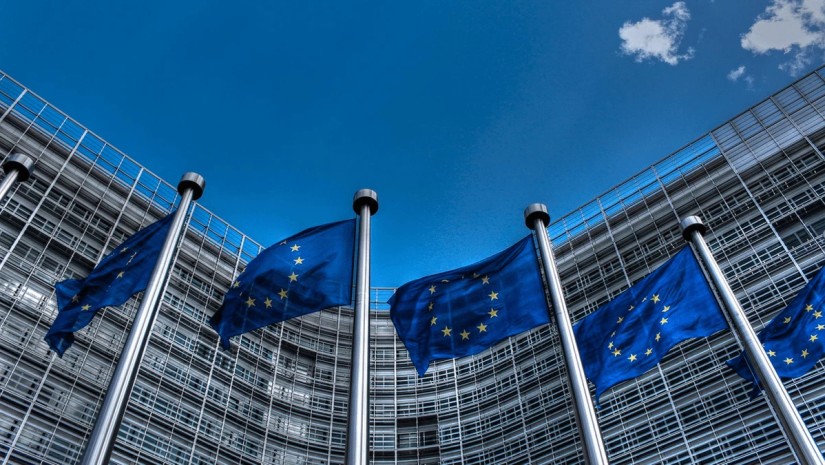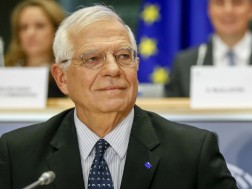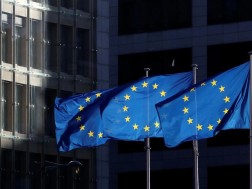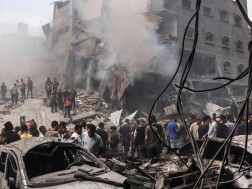After five hours of closed-door discussions, EU leaders on Thursday agreed to call for “pauses for humanitarian needs” to allow aid into Gaza despite last-minute attempts by Spain to push for wording that sounded closer to a more durable cease-fire.
The conversation was so delicate, several EU diplomats told POLITICO, that no mobile phones were allowed in the room and leaders kept diplomats in the dark. These diplomats and others quoted in this story were granted anonymity to speak freely about the sensitive discussions.
European Council President Charles Michel welcomed the “strong unity” among EU leaders at a press conference in the early hours of Friday morning, soon after the end of day one of the two-day summit in Brussels.
Michel’s comments came as foreign ministers discussed the merits of a humanitarian “pause” or “pauses” and other phrasing beginning Monday, with negotiations continuing into the summit’s first day. A line on a “humanitarian pause” in the summit conclusions was considered too sensitive for some EU countries because it could reflect phrasing angling toward a cease-fire.
EU leaders finally landed on the plural version, with calls for access to aid for the Palestinians in Gaza through “humanitarian corridors and pauses for humanitarian needs.” The EU aligned with U.N Secretary General António Guterres’ push for “an immediate humanitarian ceasefire” and U.S Secretary of State Antony Blinken’s urging for “humanitarian pauses.”
After Hamas killed more than 1,400 people and kidnapped 200 others to Gaza on October 7, per Israeli officials, Israel responded by launching daily airstrikes, killing more than 7,000 Palestinians, according to the Hamas-run Ministry of Health in Gaza. Israel also imposed a “complete siege” on the Palestinian enclave, of which it controls its air, land and sea borders since 2007, by cutting off water, electricity, food and fuel. Some hospitals and UN-run buildings, where hundreds of thousands of Palestinians are sheltering, have run out of fuel. A majority of the 2.2 million Palestinians in Gaza were reliant on humanitarian aid before the Israel-Hamas war.
Given the lengthy discussions and negotiations it took to reach agreement on the language alone — leaving the U.S., Qatar and Egypt, among others, to play key roles in the war — the fragile EU consensus could be short-lived once Israel’s Prime Minister Benjamin Netanyahu prepares to launch a full-fledged ground invasion of Gaza.
In the days and weeks since Hamas’ attack, the EU has struggled to remain on consistent and united footing around its response to the war. European Commission President Ursula von der Leyen traveled to Israel, sounding nearly unequivocal in her support for the country. The EU’s top diplomat, Josep Borrell, has more openly called out Israel’s actions, such as its siege and its demands that over a million Palestinians leave their homes in the north of Gaza and move south. For countries like Germany, Austria and the Czech Republic, anything resembling a cease-fire was too sensitive as they stressed Israel’s right to defend itself.
The other statement leaders came together to make nearly a week after the Hamas attack was to agree to condemn Hamas, backing Israel’s right to defend itself “in line with international law” and supporting the two-state solution.
It was not easy to reach an agreement on that four paragraph statement, a senior diplomat later said.
Spanish curveball
Earlier Friday, Austria — one of Israel’s staunchest allies — maintained it had an issue with the text. By the end of the day, Spain took issue with the wording, highlighting the complexity of the issue.
According to three EU diplomats, Spain threw in a last-minute curveball by circling back to a demand for the singular “pause.”
Spanish officials denied they made the request.
A final tweak to the text did reflect a Spanish push to support “the holding of an international peace conference soon,” a line which was not in the draft distributed on Thursday. In 1991, Spain hosted a historic Middle East peace conference which was dubbed the “Madrid Conference.”
Michel said the idea was on the table during a recent meeting in Egypt and that acting Spanish Prime Minister Pedro Sánchez pushed for language supporting the peace conference.
For the Socialist prime minister, the Palestinian cause within the longer Israeli-Palestinian conflict is a critical one as he intends to form a minority government with the left-wing Sumar coalition, which wants Spain to “unilaterally and unconditionally” recognize Palestine as an autonomous state. Sánchez’s party maintains that Madrid’s stance toward the Israeli-Palestinian conflict should be guided by the common positions adopted by the EU.
While Sumar pushed to have its stance included in the governing agreement between the two parties, the formal pact signed by Sánchez and leftist leader Yolanda Díaz on Monday reflected the Socialists’ EU-bound position, committing Spain to “actively work to promote diplomatic channels that allow progress towards peace in the Middle East and between Israel and Palestine.”
A second senior EU diplomat criticized Spain for defying its supposed neutrality — it holds the rotating presidency of the Council of the EU — by delaying the agreement on a common line on the conflict in Gaza.
Normally, the holders of the presidency should be “an honest broker,” the diplomat said. “But they have been honest spoilers,” POLITICO reports.
















